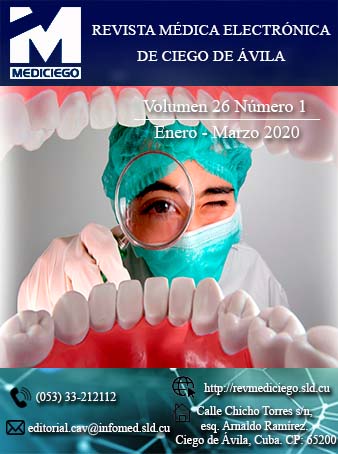Educative intervention on oral hygiene in children from the bolivarian school “Francisco de Miranda” in Caroni Venezuela
Keywords:
salud bucal, higiene bucal, niño, Educación de la población, actitudAbstract
Introduction: schoolchildren live a stage characterized by intense learning processes. In it, values, attitudes and behaviors are forged towards life and taking care of your oral hygiene.
Objective: to evaluate the effectiveness when applying an educational intervention on oral hygiene in schoolchildren of primary level of education.
Methods: a pre-experimental community intervention type before-after study was carried out in 60 children between eight and 11 years of age from the Bolivarian School “Francisco de Miranda” in the Caroní municipality, Bolívar state in Venezuela, between April and December 2015. A survey with a diagnostic questionnaire was applied to measure the level of knowledge before and after the intervention. In addition, the Love oral hygiene index was used for its determination at the beginning and end of the study. From the initial results, an educational program was developed and applied. Ethical precepts were followed.
Results: the 10 years (36,67 %) and the male sex (66,67 %) were the most represented. Before instruction, eight children (13,33 %) had a good level of global knowledge about oral hygiene, and subsequently it rose (86,67 %). In the same way it happened with the three themes partially evaluated. Before the intervention, oral hygiene verified through dentobacterial plaque control was poor (90,00 %) and afterwards, good (93,33 %). Statistically significant differences were found in all of them.
Conclusions: the effectiveness of the educational intervention on oral hygiene was demonstrated in primary school childrenDownloads
Published
How to Cite
Issue
Section
License
Copyright (c) 2021 María Isabel Leal Rodríguez, Eliany Patterson Serrano, Elaida Serrano González, Noemi Zamora Guevara, Lisandra María Vinardel Jardínez, Ramón González Martínez

This work is licensed under a Creative Commons Attribution-NonCommercial 4.0 International License.
Those authors who have publications with this journal accept the following terms of the License CC Attribution-NonCommercial 4.0 International (CC BY-NC 4.0):
You are free to:
- Share — copy and redistribute the material in any medium or format for any purpose, even commercially.
- Adapt — remix, transform, and build upon the material for any purpose, even commercially.
The licensor cannot revoke these freedoms as long as you follow the license terms.
Under the following terms:
- Attribution — You must give appropriate credit , provide a link to the license, and indicate if changes were made . You may do so in any reasonable manner, but not in any way that suggests the licensor endorses you or your use
- No additional restrictions — You may not apply legal terms or technological measures that legally restrict others from doing anything the license permits.
The journal is not responsible for the opinions and concepts expressed in the works, which are the exclusive responsibility of the authors. The Editor, with the assistance of the Editorial Committee, reserves the right to suggest or request advisable or necessary modifications. Original scientific works are accepted for publication, as are the results of research of interest that have not been published or sent to another journal for the same purpose.
The mention of trademarks of specific equipment, instruments or materials is for identification purposes, and there is no promotional commitment in relation to them, neither by the authors nor by the editor.






















